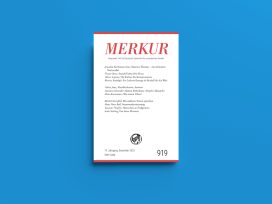
The state unconscious
K24 November–December 2025
Horizons of the Turkish novel; dissident disappointments; communists real and false; the feminine street.
The participation of the author in a symposium on literature and the media, organized by the Adam Mickiewicz Institute (Polish equivalent of the Cervantes Institute) has inspired this contribution to the eternal debate about criticism. In it, Mihály Dés reexamines the role of the critic and of literary criticism, a role, he argues, that remains as important as ever.
Criticism is the most disparaged of genres. Although dependent on it, it is scorned by the author and irritates the editor. Both energetically demand honest criticism as long as it eulogises their books. If not, such criticism is regarded as frivolous and malicious, the fruit of ignorance and a search and destroy operation. “How many authors remain who do not yet refuse to speak to you?” asks the old critic of the young according to an anecdote I was just told in Krakow in a symposium on Literature and the Media. “About five”, says the youth. “Then you are not yet a good critic,” responds the other. Although there are those who accuse us of excessive generosity, at Lateral we are well on the way to reaching the ideal of the old Polish critic.
Not even the critics themselves hold their own genre in much esteem. The academic analyst considers journalistic criticism frivolous, and the professional critic believes that articles by university professors are monotonous positivist outpourings or indigestible theoretical ramblings. Readers tend to believe that all of them attach more importance to their own glory than to the book or author of which they speak. It is a fairly generalised view that, instead of forging a link, criticism separates the work from the reader. Curiously, almost all the vices of current criticism have existed since the dawn of this bastard or, according to Steiner, eunuch genre. One of them is the subjectivity of the appraisal. Another has to do with the interest created around culture. The third is linked to the models the critic has before him to carry out the evaluation.
With respect to subjectivity, neither art nor music criticism is exposed to such arbitrariness. It is true that they lack the appropriate language and use jargon, but, as their material is the form, they work with objective elements.
In my native Hungary there is (or, at least, in the era of real socialism there was) a curious phone service whose number appeared alongside that of the police, fire and ambulance services. It was called normal do. In moments of uncertainty, crisis of values or an out of tune piano one dialled the number and, immediately, heard normal do, a secure and fixed point, a musical meridian, a solid value in the unbearable universal relativity. But literature, and above all narrative, has no measure like normal don. Only the classics – the canon, time, tradition – constitute a kind of literary scale with which to measure ourselves. But if even Shakespeare, the most unquestionable author on earth, is questioned, any attempt to elevate criticism to the sphere of a science is destined to fail.
With reference to the interests created around the world of culture, nothing contemporary is capable of surpassing the decadence and corruption described by Balzac in Lost Illusions: not the current publishing concentration, nor its symbiosis with the media, nor even the fact that (at least in Spain) the majority of critics make their living working (among other things) for the book industry whose products they judge in their reviews.
That leaves the third point: the models that, like a palimpsest, the critics have in mind when they begin to judge. In a culturally weakened era – in which the humanities have a rather decorative role, the teaching of classics has practically disappeared and the democracy of the market has lowered cultural knowledge and expectations -, not all critics have such models within their reach. For many reviewers any sombre setting is Kafkasque, any language play takes them to Joyce and any story with more than two hundred pages and four characters is a total novel.
If the situation summarised here without acrimony seems discouraging, I would remind you that our postmodernity has managed to bring about some improvements worthy of consideration. The majority of them have to do with quantity and speed.
In Spain about 54,000 titles are published each year. This means 4,500 books a month and 150 a day. Even if we consider that a proportion of these is written in Catalan, Basque and Galician (and if we resign ourselves to the little interest in what is published in these languages), and that a proportion of these are text books, technical guides, etc., there are at least 30 or 40 reviewable new releases for each day of the year, including holidays and weekends.
To the traditional functions of criticism is added, then, a new one with special relevance: selection. In the dictatorships, be they of the right or left, the whole world knew which book had to be read, even when it was not published. In the post-industrial democracies even perfectly published masterpieces are ignored. Almost all of the books that in the last decade have managed to bowl me over and revitalise me (Married Life, The Fifth Corner, A World Apart…) were hardly received by critics or readers, not even among the happy few.
Before, criticism was committed to judging certain kinds of books (almost all the novels, for example), evaluating some as good and others as bad. Given that this is now impossible, it is more important to not talk of the bad ones (with the exception of the rubbish supported by large companies and rich prizes), and try to discover the ones that can be salvaged from the restless tide.
It is true that liberating oneself from the weight of tradition, from what Harold Bloom calls “the anguish of influences”, current readers are less prejudiced and have increased interest in works from countries that until now could barely be located on a map. But this healthy geographic advance becomes literary only if we manage to take on other traditions, for which it is indispensable to know our own. It looks great to call for the extension of the western canon, but it is difficult to do so from a position of ignorance. Goethe was already aware of this when one day in 1827 it occurred to him to predict the end of national literature and the beginning of the era of universal literature. Recognising the unavoidable necessity of globalizing “what is Chinese” or “what is Serbian”, he urged a return to the Greeks.
The truth is that we are much further away from Goethe than he was from the Greeks. But even so we still have certain commitments. Literature is a fiction made reality with the reading of it. If criticism wants to crawl out of the guild ghetto in which it has put itself and, therefore, has been putting the literature it represents, it must recognize that, going back to Goldoni, it is a : literature and its readers. And this means accepting that, in addition to receptor and informer, the critic is the one who creates expectations of literature and sets its challenges, even if wrongly. Paraphrasing Lampedusa, if criticism tries to make everything the same – or, in other words, to play a role as decisive in the transmission of literature as in the past -, everything should change completely. And as this is possibly too much to ask, nothing will be as it was before.
Published 31 January 2003
Original in English
First published by Eurozine
Contributed by Lateral © Lateral / Eurozine
PDF/PRINTSubscribe to know what’s worth thinking about.

Horizons of the Turkish novel; dissident disappointments; communists real and false; the feminine street.

Leibniz’s Europe; why majority rule is relative; social chromatics off the scale; travels in post-capitalism.